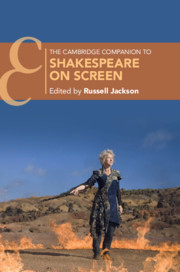Book contents
- The Cambridge Companion to Shakespeare on Screen
- Cambridge Companions to Literature
- The Cambridge Companion to Shakespeare on Screen
- Copyright page
- Contents
- Illustrations
- Contributors
- Preface
- Note on References
- Introduction
- Part I Adaptation and Its Contexts
- Part II Genres and Plays
- 5 The Comedies
- 6 The Environments of Tragedy on Screen: Hamlet, King Lear, Macbeth
- 7 Two Tragedies of Love: Romeo and Juliet and Othello
- 8 ‘Sad Stories of the Death of Kings’: The Hollow Crown and the Shakespearean History Play on Screen
- 9 The Roman Plays on Film
- 10 Screening Shakespearean Fantasy and Romance in A Midsummer Night’s Dream and The Tempest
- Part III Critical Issues
- Part IV Directors
- Further Reading
- Filmography
- Index
- Cambridge Companions To …
5 - The Comedies
from Part II - Genres and Plays
Published online by Cambridge University Press: 11 December 2020
- The Cambridge Companion to Shakespeare on Screen
- Cambridge Companions to Literature
- The Cambridge Companion to Shakespeare on Screen
- Copyright page
- Contents
- Illustrations
- Contributors
- Preface
- Note on References
- Introduction
- Part I Adaptation and Its Contexts
- Part II Genres and Plays
- 5 The Comedies
- 6 The Environments of Tragedy on Screen: Hamlet, King Lear, Macbeth
- 7 Two Tragedies of Love: Romeo and Juliet and Othello
- 8 ‘Sad Stories of the Death of Kings’: The Hollow Crown and the Shakespearean History Play on Screen
- 9 The Roman Plays on Film
- 10 Screening Shakespearean Fantasy and Romance in A Midsummer Night’s Dream and The Tempest
- Part III Critical Issues
- Part IV Directors
- Further Reading
- Filmography
- Index
- Cambridge Companions To …
Summary
Concentrating on adaptations of As You Like It, Love’s Labour’s Lost, Much Ado About Nothing, The Taming of the Shrew and Twelfth Night, this chapter argues that Shakespeare’s comedies on screen constitute a significant and cross-fertilizing body of work. Scriptwriters have pursued imaginative routes through the syntax of the comedies, and there has been considerable experiment in terms of updating Shakespeare’s language. Comedy is the genre where constructions of gender/sexuality are often expressed with filmmakers recognizing in Shakespeare’s comedies opportunities to explore agency, voice and embodiment. The comedies on screen anticipate many of the themes energizing recent criticism, and in this there is a pronounced self-consciousness. Harking back to earlier experiments, the most recent Shakespearean comedies showcase their own artifice along with strategies of revision dependent on a dense intertextuality.
Keywords
- Type
- Chapter
- Information
- The Cambridge Companion to Shakespeare on Screen , pp. 67 - 78Publisher: Cambridge University PressPrint publication year: 2020

